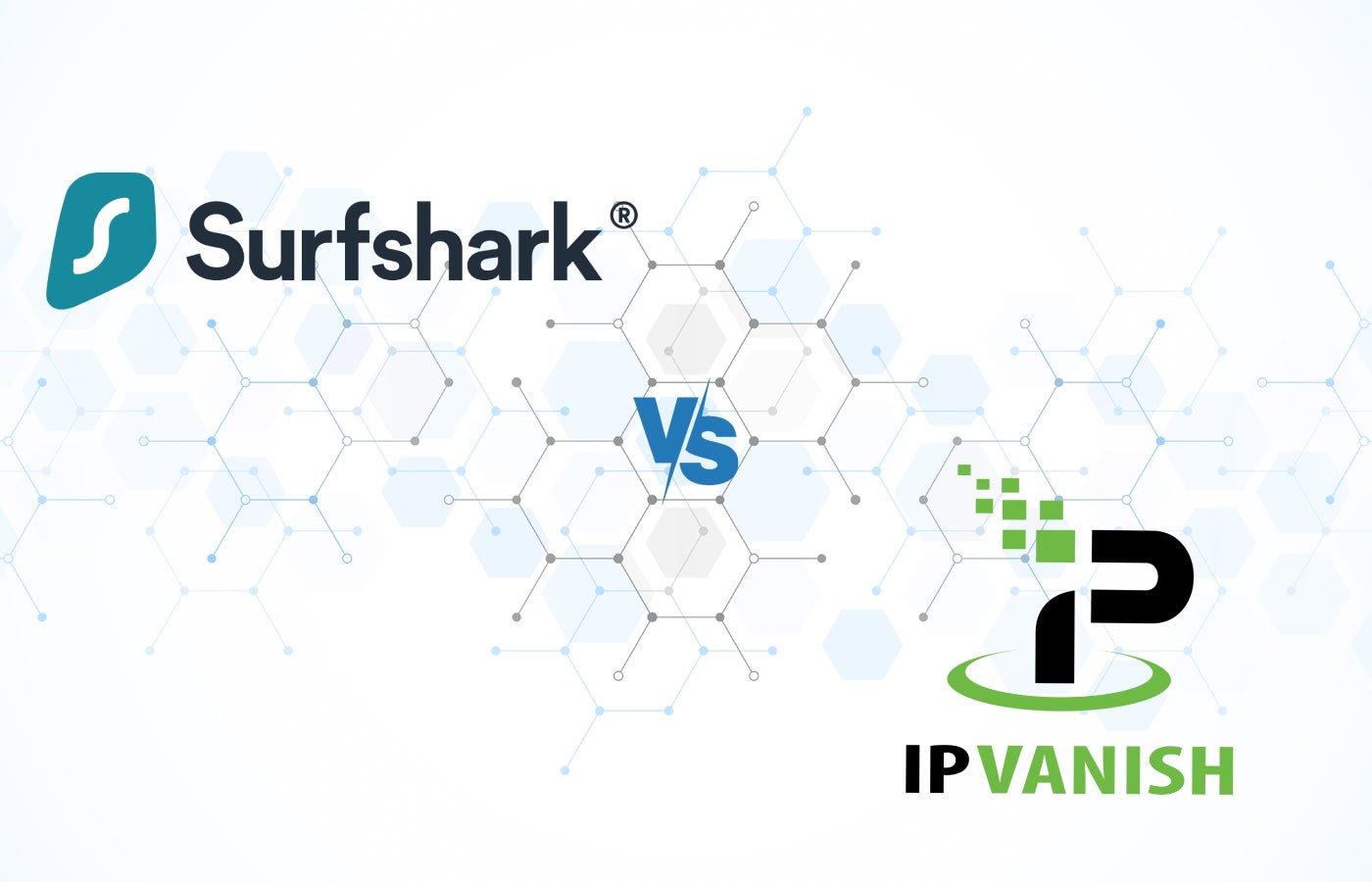
Surfshark and IPVanish are premium virtual private network services that mask your IP address and internet activity so you can browse privately. These VPNs let you connect via servers in other cities and countries, so you can disguise your location from outside observers or access region-locked streaming content. In this review, I compare Surfshark and IPVanish based on pricing, speed, features, customer support and ease-of-use and recommend which service to choose based on your use case and requirements.
- Surfshark: Best for those who need as much anonymity as possible, such as journalists, political activists and others living or working under heavy censorship and surveillance.
- IPVanish: Best for users looking for maximum VPN speeds for torrenting and streaming on a local server, or those who want live customer support to guide them through implementation.
1
Semperis
2
ESET PROTECT Advanced
Employees per Company Size
Micro (0-49), Small (50-249), Medium (250-999), Large (1,000-4,999), Enterprise (5,000+)
Any Company Size
Any Company Size
Features
Advanced Threat Defense, Full Disk Encryption , Modern Endpoint Protection, and more
3
NordLayer
Employees per Company Size
Micro (0-49), Small (50-249), Medium (250-999), Large (1,000-4,999), Enterprise (5,000+)
Small (50-249 Employees), Medium (250-999 Employees), Large (1,000-4,999 Employees), Enterprise (5,000+ Employees)
Small, Medium, Large, Enterprise
Surfshark vs. IPVanish: Comparison table
| Features | ||
|---|---|---|
| Supported devices | ||
| Server pool | ||
| Speed | ||
| Ad blocking | ||
| Split tunneling | ||
| Privacy policies | ||
| Support | ||
| Starting price | ||
| For more information |
|
|
Surfshark vs. IPVanish: Pricing
Both companies offer a seven-day free trial of their VPN product if you download the mobile app and register your account through it.
Surfshark pricing
Surfshark offers three different VPN plans (Starter, One and One+), and each plan can be purchased as a monthly, yearly or two-year subscription.
| 24 months | |||
| 12 months | |||
| 1 month |
Surfshark’s full VPN feature set is included in the Starter Plan. For just a few cents more per month (for the long-term subscriptions), you can get the One plan with antivirus, identity theft monitoring and webcam protection, which is the best value. The only feature you gain with a One+ plan is a data removal service for particularly privacy-conscious customers. Surfshark provides significant discounts for committing to a one-year or two-year subscription, so I don’t recommend signing up for a pricier monthly plan if you can avoid it, especially since you get a 30-day money-back guarantee on long-term subscriptions.
For more information, read our full Surfshark VPN Review.
IPVanish pricing
IPVanish has a much simpler pricing structure, in that there’s only one VPN plan that includes all the features. The only difference is the duration of your commitment.
| 24 months + 3 free months | |
| 12 months + 3 free months | |
| 1 month |
Like Surfshark, IPVanish pushes customers towards one- or two-year plans by offering steep discounts; they also add-on three free months of service to these plans. IPVanish offers a 30-day guarantee for long-term subscriptions as well, so I recommend taking advantage of the commitment-based discount unless you only need short-term protection. Monthly plans normally cost $12.99, but IPVanish automatically applies a 15% discount at checkout, bringing the price down to $10.99 for the first month.
For more information, read our full IPVanish VPN Review.
Surfshark vs. IPVanish: Feature comparison
Supported devices
Winner: Tie
Both Surfshark and IPVanish allow unlimited app installations per account with no traffic limits.
Surfshark provides apps for Windows, Mac, Linux, Android, iOS, Chrome, Firefox, Edge, routers, Fire TV, Apple TV, PlayStation and Xbox.
Need help configuring Surfshark on your device? Read our Surfshark VPN guide.
IPVanish offers apps for Windows, Mac, Linux, Chrome OS, Android, iOS, Apple Vision Pro, routers, Apple TV, Fire TV, NVIDIA Shield, ONN 4k, Google Chromecast and Nokia Streaming Box.
Figure A
Server pool
Winner: Surfshark
Surfshark has 3,200+ RAM-only servers in 107 locations in 100 countries; 37 of these servers offer static IP addresses for IP-sensitive applications. Surfshark also offers 12 multihop VPN duos that allow you to route VPN traffic through two servers in different locations for greater anonymity, as shown below.
Figure B
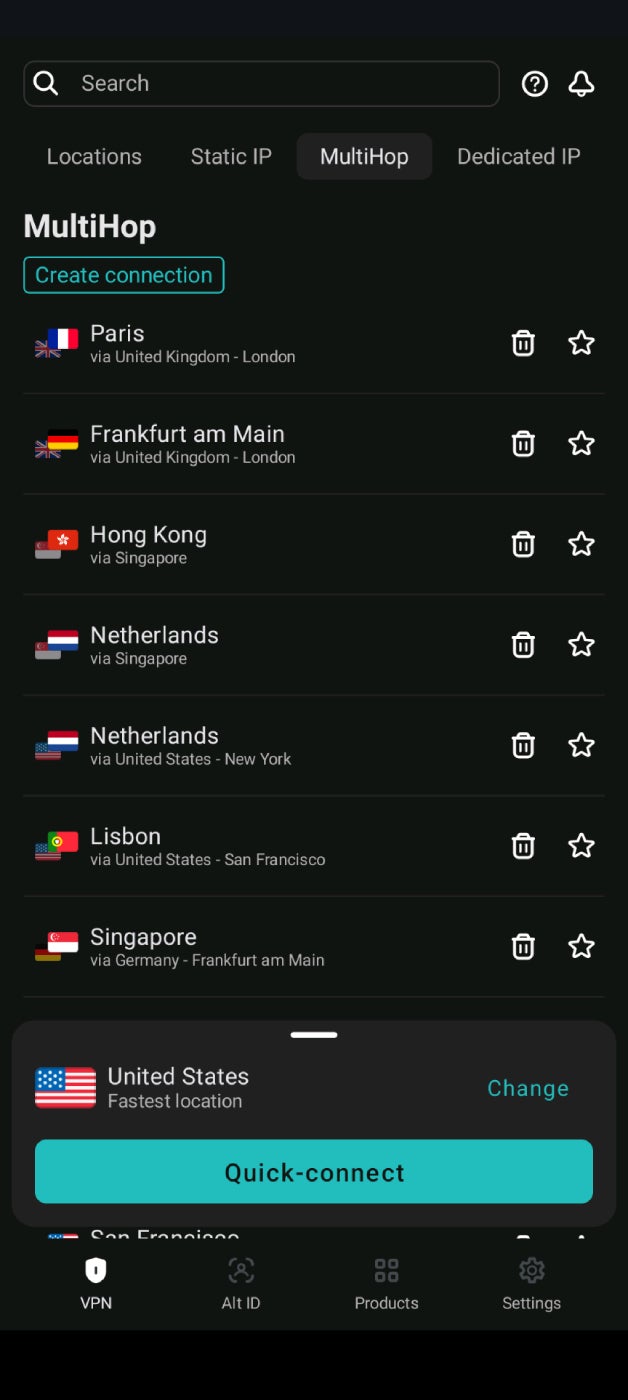
IPVanish has 2,400 servers in 90 cities in 57 countries. It does not offer multihop (a.k.a. double-VPN), so if it’s a must-have feature, I recommend going with Surfshark.
Speed
Winner: IPVanish
My baseline stats without a VPN were as follows: Download speed was 271.32 Mbps, upload speed was 239.99 Mbps and latency (ping) was 10 ms.
While using Surfshark connected to the fastest server option, I measured an average download speed of 76.77 Mbps and an upload speed of 80.53 Mbps with 2 ms of latency. Connected to a less ideal server in Singapore, my download speed was 24.85 Mbps, upload was 15.52 Mbps and ping was 34 ms.
With IPVanish connected to the optimal location, I measured a highly impressive download speed of 180.56 Mbps and upload speed of 123.36 Mbps, with 8 ms of latency, as shown below.
Figure C
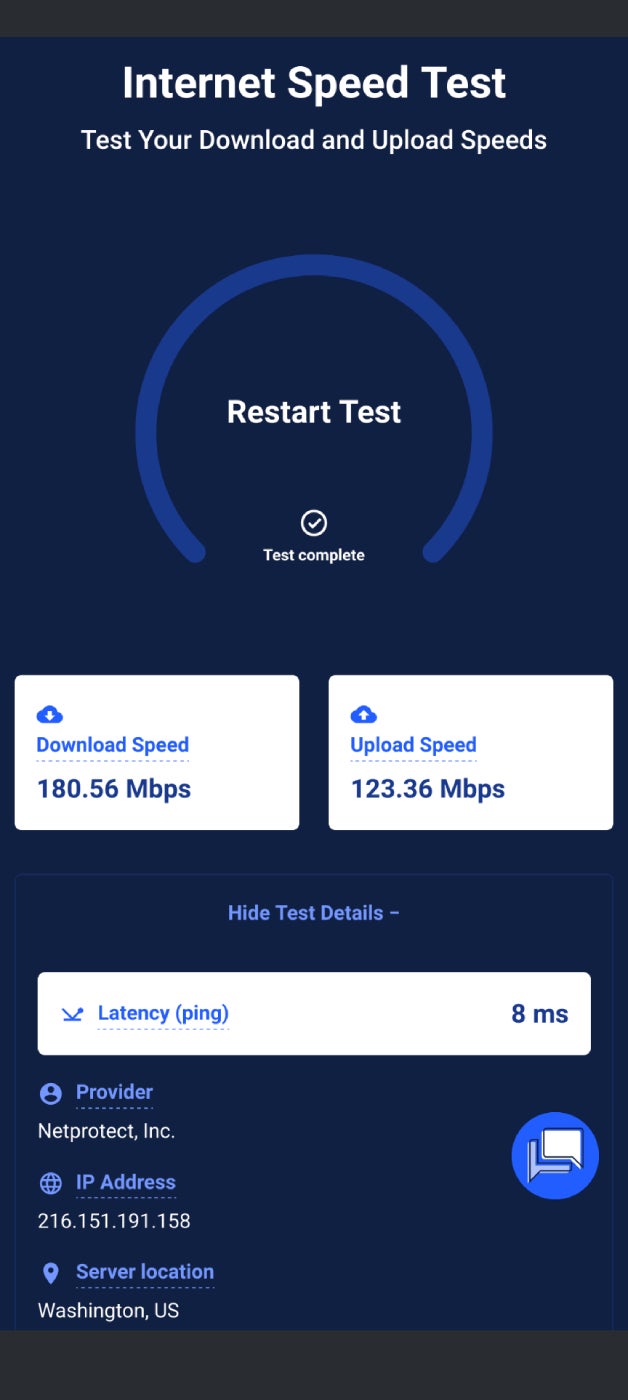
When I connected via Singapore, my download speed dropped to 21.38 Mbps, upload speed was 12.88 Mbps and ping jumped way up to 241 ms. So, IPVanish offers better speeds if you let it connect to your optimal server location, but Surfshark performs slightly better when using servers further away.
Ad blocking
Winner: Tie
Surfshark VPN includes the CleanWeb feature for both browsers and apps that blocks ads, cookies and pop-ups. CleanWeb also detects malware in web content and provides alerts when your credentials are found in a known data breach.
SEE: Surfshark vs. NordVPN: Which VPN Is Better in 2024? (TechRepublic)
IPVanish offers the Threat Protection feature, which includes ad, cookie, tracker and malicious website blocking for browsers and apps.
As of the time of this writing, both VPNs successfully blocked YouTube ads (without disrupting the content) in the YouTube app and all browsers.
Split tunneling
Winner: Tie
Both VPNs include a split tunneling feature that allows trusted apps and websites to bypass the VPN and connect over the unprotected Internet. Surfshark’s version (called Bypasser) also has a Route via VPN feature for some platforms, so you can ensure riskier apps and websites are protected by default.
Figure D
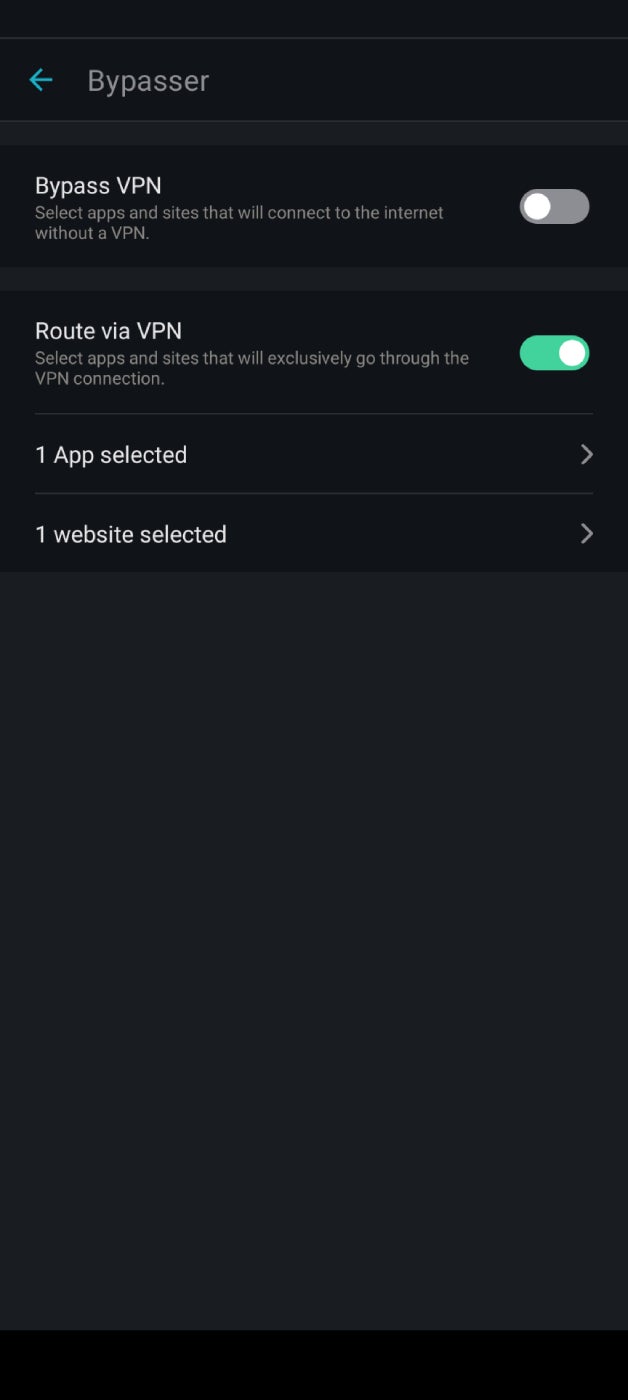
IPVanish, on the other hand, lets you add websites at the domain level, which you might find more convenient if you’re a web developer or otherwise working with a lot of subdomains.
Privacy policies
Winner: Surfshark
Both Surfshark VPN and IPVanish have no-logs policies, meaning they do not retain logs relating to your Internet activities while connected to their services. However, both companies operate in jurisdictions that could legally require them to provide this information to law enforcement.
Surfshark’s VPN servers are 100% RAM-only, meaning they cannot retain any usage data after being rebooted. Additionally, Surfshark lets you pay with cryptocurrency to remain completely anonymous.
Figure E
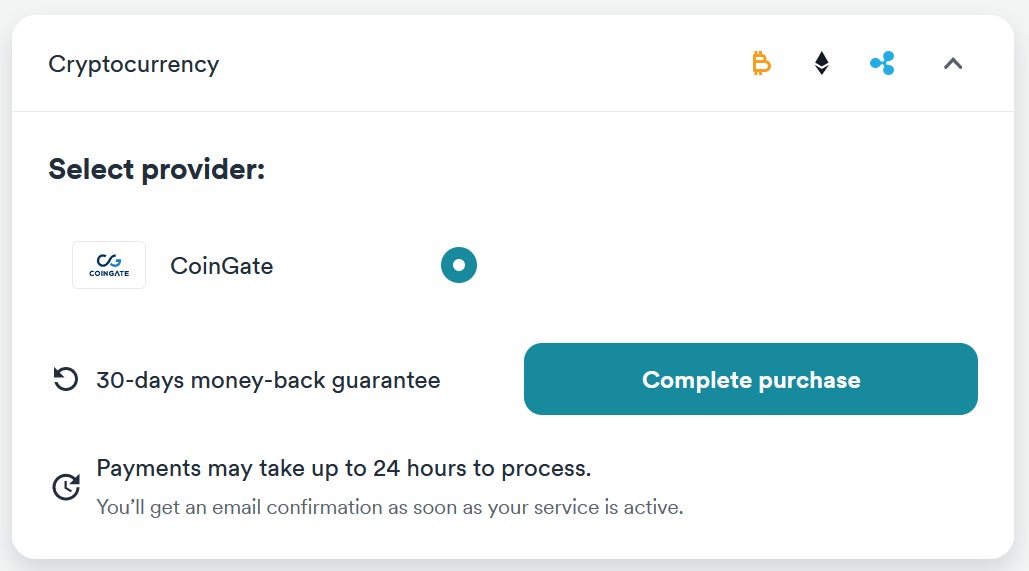
IPVanish, on the other hand, does not collect activity data at all unless compelled by law. However, it does not offer anonymous payment options.
Support
Winner: IPVanish
Surfshark has a robust self-help center, email ticketing support and 24/7 live chat. The chat feature requires quite a bit of interaction with an automated chatbot before you can speak to a human agent, however.
Figure F
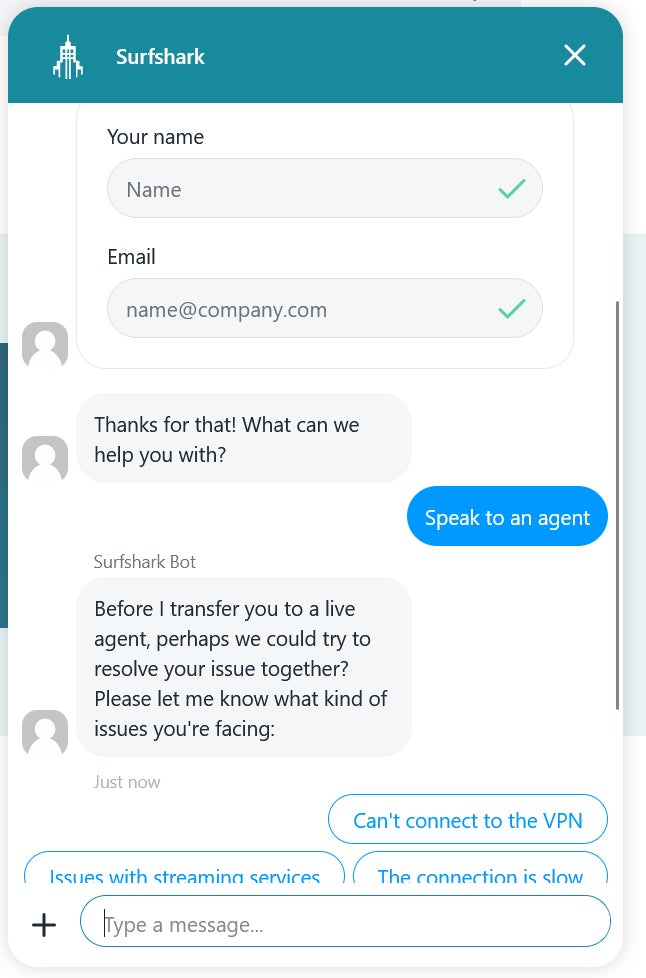
IPVanish also offers a self-help portal and email ticketing support. There is a 24/7 chatbot, and two easy clicks connect you to a human agent within “standard business hours.” Additionally, if you click the Get Started button in the site’s navigation menu, you can see a list of phone numbers to call for sales support.
Additional free features
Winner: Surfshark
Additional features included with all Surfshark VPN plans:
- Static IP addresses: Gives you the same IP address every time you connect to the same server.
- Alternative ID: Generates a fake name, address and email to use online, masking your real info to reduce spam and identity theft.
Figure G
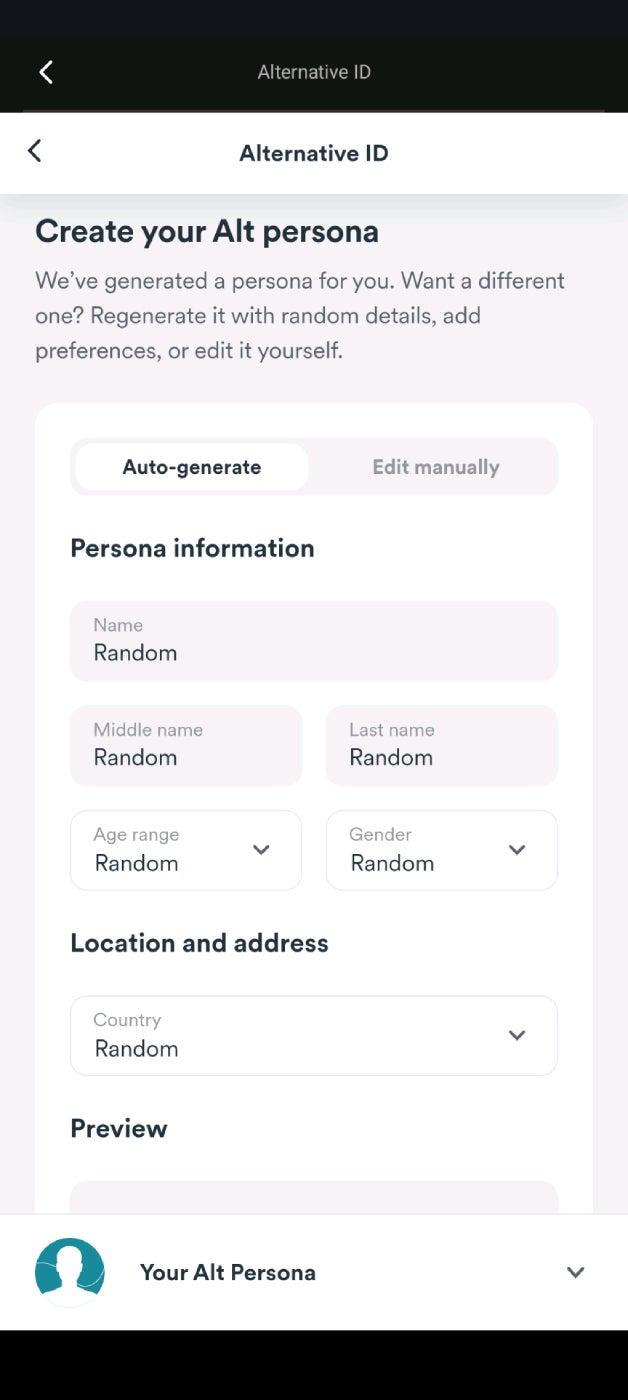
- Auto-connect: Automatically reconnects the VPN when you change networks or restart your device.
- VPN kill switch: Disables all internet access when the VPN connection is interrupted or turned off.
- Discover on LAN: Allows you to access other devices on the local network while connected to the VPN.
- Override GPS location: Matches your device’s GPS location to the VPN server location.
- Rotating IP: Automatically rotates your IP address over the course of your session to increase your anonymity.
Additional features included with all IPVanish plans:
- LAN access: Allows local network traffic to be routed outside the VPN.
- Connect on Startup: Activates the VPN as soon as Internet traffic is detected on your device.
- Kill switch: Disables your internet connection when your VPN isn’t active.
Surfshark’s Alt ID, GPS override and rotating IP features offer a much greater degree of privacy, making it the superior choice for journalists, political activists and others who need to hide their activity from state surveillance.
SEE: Cloud Security Policy (TechRepublic Premium)
IPVanish’s website does offer some free tools, though, such as an IP address checker, a link safety verifier and a secure password generator.
Figure H
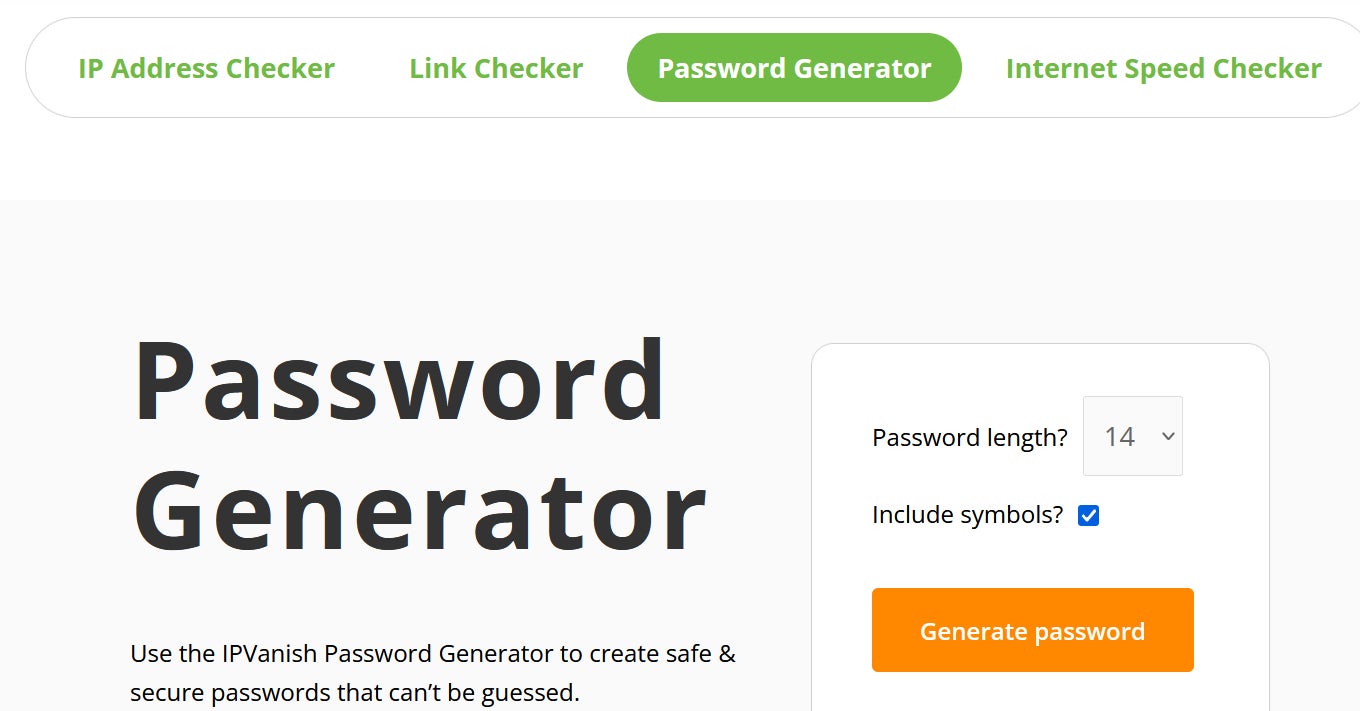
Additional paid features
Winner: Surfshark
Surfshark offers multiple additional security and privacy products for an additional cost. These include antivirus software; a private, localized search engine; and data breach monitoring that notifies you when your personal information is leaked (which is included in the One+ VPN plan).
IPVanish does not offer any add-on products.
Surfshark pros and cons
Pros of Surfshark
- Offers apps for PlayStation and Xbox gaming consoles.
- Has a larger server pool, including 37 with static IPs and 12 multihop (double-VPN) server duos.
- The Route via VPN feature enables the VPN by default for certain apps and websites.
- Uses 100% RAM-only servers that do not retain usage logs after reboot.
- Supports anonymous cryptocurrency payments.
- Provides many additional free and paid features for greater privacy.
Cons of Surfshark
- I experienced slower speeds with Surfshark than with IPVanish when connected to my optimal server.
- Doesn’t support split tunneling for an entire domain.
- Collects and temporarily retains usage logs that could be turned over to law enforcement.
- Automated chatbot support can be frustrating to navigate.
IPVanish pros and cons
Pros of IPVanish
- Its monthly plan is a little less expensive than Surfshark’s.
- Provided superior speeds when connected to my optimal server.
- Its split tunneling allows entire domains to bypass the VPN.
- Only collects usage logs if compelled by law enforcement.
- Offers an intuitive support experience with live chat and phone options.
Cons of IPVanish
- Does not provide static IP addresses or double-VPN capabilities.
- Domain-level split tunneling isn’t available for all platforms.
- Does not allow anonymous cryptocurrency payments.
- Lacks many of the features and add-on products offered by Surfshark.
Should your organization use Surfshark or IPVanish?
Choose Surfshark if:
- You’re a journalist, political activist or otherwise need as much anonymity as possible.
- You need a static IP address to avoid blocklists and captchas.
- You’re looking for additional security and privacy capabilities, like a fake persona generator or anti-malware software.
Choose IPVanish if:
- You’re a home or business user looking for added privacy or a way to access streaming content from another region.
- You need the maximum VPN speeds and don’t mind using a local server.
- You want access to live customer support.
Review methodology
I evaluated Surfshark VPN and IPVanish based on five categories: pricing, core VPN features, ease of use, customer support and hands-on analysis. I used seven-day free trials of Surfshark Starter and IPVanish to test their performance, capabilities, usability and customer support experience. I validated speed and performance using an independent testing website and used both VPNs with a wide variety of apps, browsers and websites. I also compared my experiences with real customer reviews from websites like Trustpilot.
Learn more about TechRepublic’s review methodology for VPNs.







